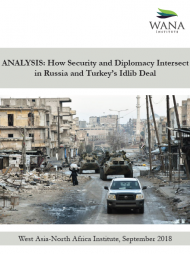-
ANALYSIS: How Security and Diplomacy Intersect in Russia ...
ANALYSIS: How Security and Diplomacy Intersect in Russia and Turkey’s Idlib Deal
By mid-September 2018, the Bashar al-Assad regime was poised to launch a military campaign on the last major opposition stronghold in Idlib, Syria. With considerable military buildup, it seemed that a wide-scale operation to retake the province—one that would have threatened the estimated 2.5 million residents of Idlib—was imminent. On 17 September, Russian President Vladimir Putin brokered an agreement with Turkish President Recep Tayyip Erdoğan in Sochi that seems to have spared Idlib—at least for now. The agreement stipulates that Russia and Turkey establish a 15-25 kilometre buffer zone separating regime forces and opposition fighters and that the zone be jointly patrolled by Russian and Turkish troops. The agreement also stipulates that the opposition’s heavy weaponry be removed from this zone by 10 October and that “radical terrorist groups” be removed by 15 October.
With this, a handful of questions emerge: What drove Turkey and Russia to broker the deal? How does the agreement—one that stands to prevent Assad from retaking territory from fighters who threaten Russian interests—fit into Russia’s agenda for post-conflict Syria? Can parties uphold the agreement? And, if not, what can the agreement actually accomplish?

